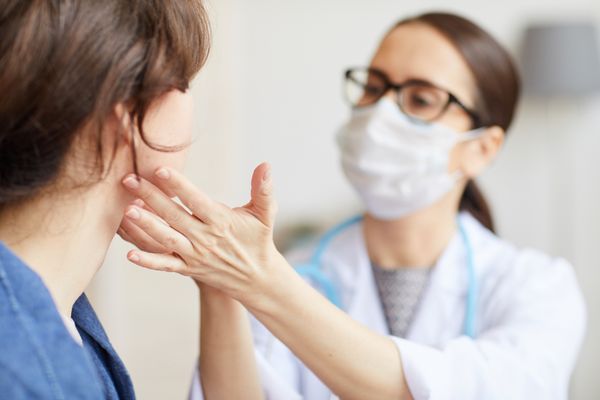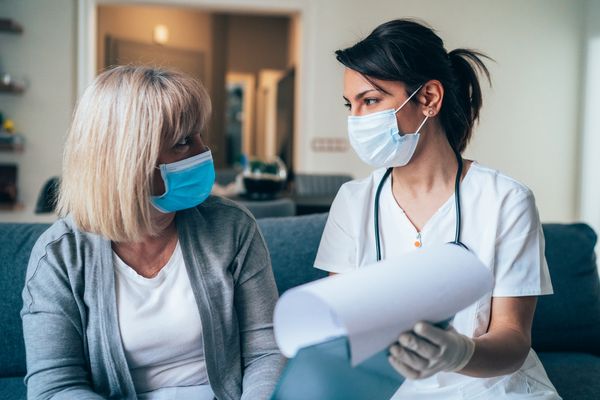This article has been archived. We will no longer be updating it. For our most up-to-date information, please visit our preventive health information here.
The Importance of Visiting a Health Care Professional
Now that you're footing the bill for your own health care, you're probably wondering what's really necessary to keep you healthy. Your questions might include: How often do I need to go to for a check up? Which tests should I have? What health problems are most common for my age? Here are some answers.
Finding a health care provider with whom you can frankly discuss your health care questions and concerns is perhaps the most important thing you can do for your health in your 20s. These are prime reproductive years for women. Menstrual issues, sexually transmitted diseases, contraception and pregnancy are among the biggest health concerns now.
Lifestyle issues like smoking, drinking, diet, sleep and stress also play big roles in your overall health. You might have questions about how to better manage these and other habits that can affect your health. Other concerns may include acne, weight control and vision problems.
If you're fairly sure you're staying where you are for awhile, you'll want to find health care professionals with whom you can build a health partnership, so you can work together to stay healthy.
Choosing a Health Care Professional
If you don't have a primary health care professional, now's the time to find one. He or she can help you establish good health habits; talk with you about proper nutrition, exercise and health risks, such as smoking, alcohol and other drug use, and sex. Your health care provider can prescribe necessary medications, perform medical procedures and offer treatments.
But how do you find the professional who's right for you? If you belong to a health plan, you most likely will need to choose someone from that plan. Request a list of plan providers in your area by calling your insurance company or checking its website. Or, ask family, friends or co-workers who have the same plan for recommendations. If you're enrolled in college, there may be a medical clinic on campus for students.
If you don't have insurance, call your local hospital's referral service, or contact a local medical society for information on where to find low-cost services. Then find out how much a typical office visit would cost. Some providers offer flexible payment plans, if necessary. Don't forget low-cost and free public health and family planning clinics, like Planned Parenthood, if cost is an issue.
There are many types of licensed medical professionals, with important differences among them. A medical doctor or doctor of osteopathy (MD or DO) can provide medical care, prescribe medicines and perform tests and procedures. A nurse practitioner (NP) can perform regular check-ups, offer preventive care and health education and prescribe medication. Health education is a big part of an NP's practice. A physician assistant (PA) can provide care and order medications, with supervision from a physician. PAs also focus on health education.
If you're starting a family, certified nurse-midwives (CNMs) and certified midwives (CMs) might interest you as a health care provider option. Both CNMs and CMs are skilled health professionals who provide primary health care for women, as well as preconception counseling, care during pregnancy and childbirth and normal gynecological services, such as Pap screenings.
Decide which of these health providers suits your needs. Also, consider whether you prefer a solo practice or large medical office with several types of professionals. You should trust and feel comfortable with your choice, and your provider should be respectful and professional. Office hours, how long you typically have to wait to get an appointment and whether or not the office is accessible by public transportation are other issues you might want to consider. This is your team, so choose what's best for you.
In addition to your primary health care professional, you may be referred to a medical specialist if you have a serious or specialized health problem, or if you need additional health assessments. You'll also need a dentist for regular check-ups and other dental care. And you'll need an eye specialist if you have vision problems. Your primary health care professional can make the appropriate referrals and help build your medical team.
Create a Family Medical History
It's a good idea now to begin pulling together the pieces of your family's medical history into one document or notebook. This information may give you a better understanding about your future health risks, genetic risks for developing certain conditions, such as cancer, heart disease, diabetes, mental illness, and vision loss, for example.
Your history should include information about your own health (such as previous or current illnesses, immunizations, hospitalizations and surgeries), as well as health details for other generations in your direct family, including parents, siblings, grandparents and great-grandparents.
Include the following information, if it's available:
- Any medical conditions and the age of the family member when the conditions developed
- Medical treatments
- Causes of deaths
Remember, family members can't always be specific about medical conditions that occurred long ago, so it can be helpful to record descriptions rather than medical terms, if they're not forthcoming. For example, "spent days in bed in dark room," rather than "suffered from migraine headaches."
To help you get started, check out the "My Family Health Portrait," created by the U.S. Surgeon General's office in the Department of Health and Human Services. Visit https://phgkb.cdc.gov/FHH/html/index.html to download this free computerized form to organize your family tree and identify common diseases that may run in your family.
Building a Partnership with Your Health Care Professional
You're the most important player on your health care team, which means you need to learn more about health and wellness from a variety of sources - newspapers, magazines, e-newsletters and Web sites. Then, be prepared to discuss what you've learned or questions you have during your visit with your health care professional. Follow these tips to make the most of your visit and to build a solid health partnership:
Be honest. Answer questions about your lifestyle, such as diet and exercise, sexual practices, or use of alcohol, tobacco and other drugs, truthfully. The same goes for prescription and over-the-counter medicines you are taking, including vitamins, herbal products and other supplements.
Speak up. You might be embarrassed to talk about sexually transmitted diseases, smoking, drinking, drugs, or even depression, but the medical office is the place to start a discussion. Health professionals are trained to handle these issues and others, so speak up--it could save your life!
Share your family medical history. Also ask about factors that could put you at higher risk for diseases or conditions.
Know the signs of illnesses and diseases. Get medical care promptly if needed. If you have a chronic medical condition, be sure it's documented somewhere in your wallet or purse; or consider wearing a medical alert bracelet.
Ask questions. Make a list before your appointment. If you are diagnosed with a condition, get all the details and write them down. Always ask for a full explanation of treatments or drugs being prescribed, including potential side effects. Never leave the office if you don't understand something.
Schedule regular medical checkups and screenings. Identifying health problems at their earliest stages can often give you more or better treatment options. Find out how to get ready for your tests, if there are risks or side effects and how to get a full report of the findings.
Get a second medical opinion. If you need more information, especially when surgery or treatment for a chronic or life-threatening illness is in question, a second medical opinion is important. Ask your health care professional who you can turn to for one.
Questions to Ask Your Health Care Professional
It's in your best interest to make the most of your medical visit. But it's often easy to forget your questions. Make a copy of these and take them to your next appointment. You can review your list while you're waiting to be seen.
- How can I improve my diet and/or exercise program to have a healthier lifestyle? Ask for details. For example, if you should increase exercise, ask for examples of activities that are best for you.
- When should I have regular checkups and which screening tests should I have and when?
- How do I do a monthly breast self-exam? (Practice until you understand and feel comfortable doing it).
- How do I prevent sexually transmitted diseases?
- What contraceptive methods are the best for my personal needs and lifestyle?
- If I need a test or treatment, what is it designed to do and why is it recommended? Are there other treatments or options? Will insurance pay for the test or treatment?
- Whom should I call to find out test results (such as a Pap test) and when? (Always get a complete report on any tests you have had).
- What type of program do you recommend to help me (or my partner) quit smoking?
- If I'm overweight, can you recommend a weight loss program?
- If I think I have a substance abuse problem, who can I talk to?
Preventive Health Screenings You Need
Here are guidelines for preventive health screenings, examinations and immunizations healthy women your age should receive.
If you are at high risk for health problems such as diabetes, heart disease or other conditions, talk with your primary health care professional about any special considerations you should know about—which health screenings you should have more often, for example.
Blood pressure test for high blood pressure (hypertension): Beginning at age 20, have your blood pressure checked at each regular health care visit, or at least once every two years if your blood pressure is less than 120/80.
Chlamydia test: If sexually active, get a chlamydia test every year until age 25. If you have a history of chlamydia or other sexually transmitted diseases (STDs), or you or your partner have had multiple sex partners, you may need to be screened for other STDs. Remember: Be sure to ask about STD screenings; don't assume you're getting one automatically during your exam.
Cholesterol: If you smoke, are obese, have diabetes or high blood pressure or have a family history of heart disease, you should begin blood cholesterol testing at age 20. The testing should be repeated at least every five years or more frequently based on your risk factors and cholesterol levels.
Clinical breast exam: Get a clinical breast exam about every three years in your 20s. Breast self-exam (BSE) is one option to consider; however, research has shown that BSE plays a small role in finding breast cancer compared with finding a breast lump by chance or simply knowing what is normal. If you choose to perform a monthly BSE, ask your health care professional to show you how to perform one.
Dental exam: Visit the dentist regularly, usually every 6 to 12 months. Checkups can detect early signs of oral health problems. Professional tooth cleaning is also important for preventing oral problems and should be done regularly.
Diabetes screening: Ask your health care professional about your risks for diabetes. The blood glucose test typically isn't done until age 45, but, based on your personal health history, your health care professional may recommend a blood test that measures your blood glucose (sugar) to determine if you have diabetes or pre-diabetes, a condition that increases your risk for developing diabetes. You may be screened if your blood pressure is higher than 135/80 or if you take medicine for high blood pressure. This blood test is done after having no food and only clear liquids for 12 hours.
Eye exam: Get a complete eye exam once between ages 20 to 29. Exception: If you have vision problems, family history of eye problems, history of an eye injury or have diabetes, you should be seen more frequently by an eye care specialist.
Pap test and pelvic exam: All women should begin getting a Pap test and pelvic exam at age 21 to screen for abnormalities that could indicate pre- or early cervical cancer. You should get a Pap test and cervical exam every two to three years from ages 21 to 30. If you have had your cervix and uterus removed, ask your health care provider if you need to continue screening. Exception: if you have risk factors such as previous abnormal screenings, multiple sex partners, a weakened immune system or HIV infection, you may need more frequent Pap screenings. Guidelines vary on whether you need a Pap test every two or three years in your 20s, so talk to your health care provider about what's for you. You typically will also have a clinical breast exam at this screening appointment.
Skin exam for skin cancer: Examine your skin once a month for changes, such as moles that change color, shape or size, and ask your health care professional how often you should have your skin examined by a medical professional.
Weight: Obesity screening is now considered a preventive checkup. Ask your health care professional for more information on healthy weight guidelines or weight-management strategies.
Immunizations:
Hepatitis A: This is recommended if you have a specific risk factor for hepatitis A infection or you just want to be protected. Usually given as two doses, 6 to 18 months apart.
Hepatitis B: This vaccine is recommended for all children and adolescents not previously immunized and for all adults at high risk for infection. All pregnant women should be screened for Hepatitis B at their first prenatal visit.
Human papillomavirus (HPV): The HPV vaccine protects again four common types of HPV, including the two most likely to cause cervical cancer. It is typically given in three doses to girls ages 11 to 12, but it may be given up to age 26 for women not previously vaccinated.
Influenza (flu): You need a dose every fall (or winter) to protect you and those around you from the flu.
Measles/Mumps/Rubella: You usually get this vaccine as a small child, also. Check your medical records, if possible, to see if you've had it; if not, ask your health care professional for guidance. It's recommended for people age 18 and older who were born after 1956 and don't have a record of having it.
Meningococcal: This vaccine prevents several strains of meningitis. It's recommended for young adults in high school and college settings who did not receive it as a preadolescent.
Pneumococcal: You need one to two doses if you smoke or if you have certain chronic medical conditions.
Tetanus: If you didn't receive a series of vaccines known as combined diphtheria-tetanus toxoids as a child, you should receive the primary series. Thereafter, you should receive tetanus booster shots every 10 years.
Varicella (chickenpox): Most young children now get the chickenpox vaccine. It's also recommended for young adults in college settings who haven't been previously vaccinated.







